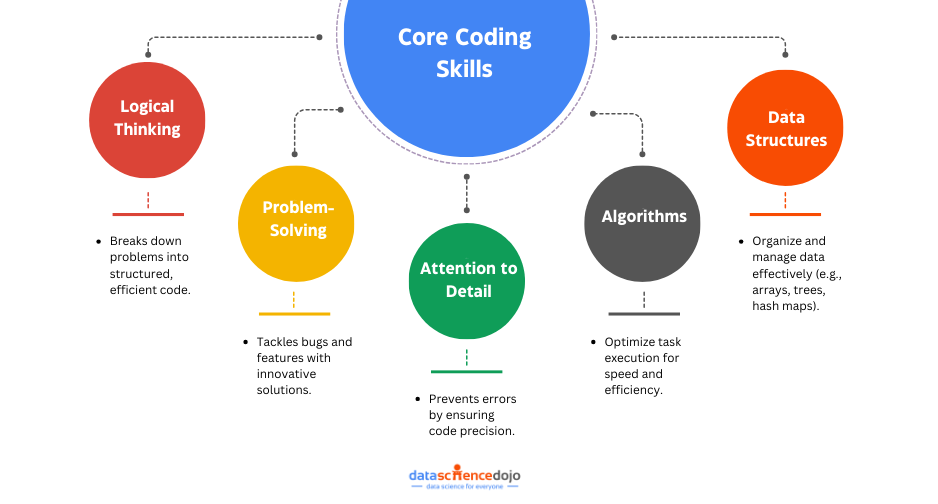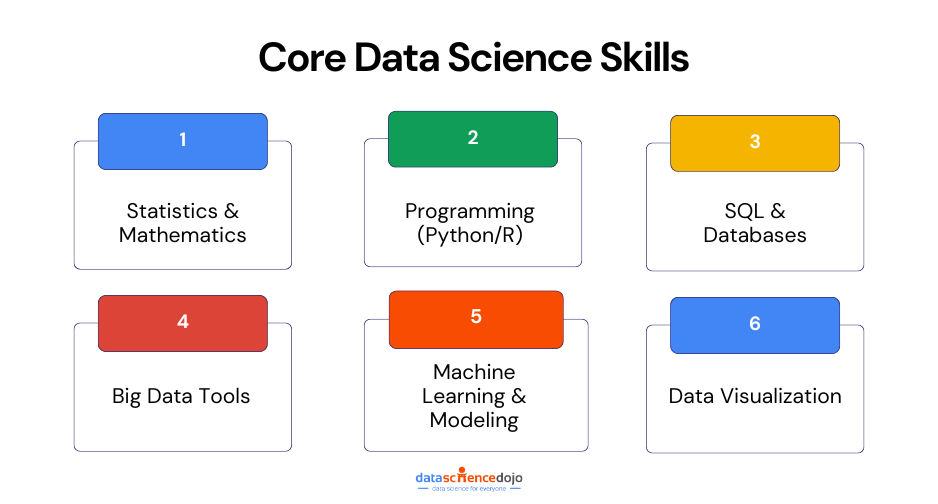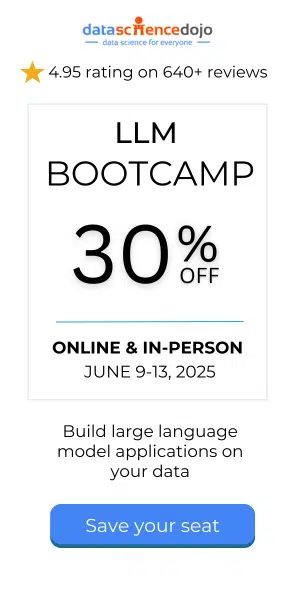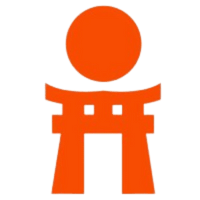In the technology-driven world we inhabit, two skill sets have risen to prominence and are a hot topic: coding vs data science. At first glance, they may seem like two sides of the same coin, but a closer look reveals distinct differences and unique career opportunities.
This article aims to demystify these domains, shedding light on what sets them apart, the essential skills they demand, and how to navigate a career path in either field.
What is Coding?
Coding, or programming, forms the backbone of our digital universe. In essence, coding is the process of using a language that a computer can understand to develop software, apps, websites, and more.
The variety of programming languages, including Python, Java, JavaScript, and C++, cater to different project needs. Each has its niche, from web development to systems programming.
- Python, for instance, is loved for its simplicity and versatility.
- JavaScript, on the other hand, is the lifeblood of interactive web pages.
Coding goes beyond just software creation, impacting fields as diverse as healthcare, finance, and entertainment. Imagine a day without apps like Google Maps, Netflix, or Excel – that’s a world without coding!
What is Data Science?
While coding builds digital platforms, data science is about making sense of the data those platforms generate. Data Science intertwines statistics, problem-solving, and programming to extract valuable insights from vast data sets.
This discipline takes raw data, deciphers it, and turns it into a digestible format using various tools and algorithms. Tools such as Python, R, and SQL help to manipulate and analyze data. Algorithms like linear regression or decision trees aid in making data-driven predictions.
In today’s data-saturated world, data science plays a pivotal role in fields like marketing, healthcare, finance, and policy-making, driving strategic decision-making with its insights.
Essential Skills for Coding
Coding is more than just writing lines of code; it’s a journey that blends creativity, logic, and analytical thinking. While mastering a programming language is a foundational step, a coder’s true strength lies in understanding how to craft efficient, scalable, and bug-free solutions.
To thrive in this field, coders need to hone a wide range of skills beyond basic syntax.
Key Skills Every Coder Should Master
-
Logical thinking: The ability to break down complex problems into step-by-step solutions is vital. Logical reasoning helps in structuring clean, efficient code and building reliable software systems.
-
Problem-solving: Coders frequently encounter challenges that require innovative approaches. Whether it’s debugging or feature development, strong problem-solving skills enable smoother, faster resolutions.
-
Attention to detail: A single misplaced character can break an entire application. Precision is crucial when working with code, as even the smallest errors can cause major issues.
Understanding core programming concepts is equally important. Algorithms and data structures form the backbone of efficient coding:
-
Algorithms are like blueprints—guiding how tasks are completed in the shortest and most efficient way possible. They help optimize speed, memory use, and scalability.
-
Data structures such as arrays, linked lists, hash maps, and trees enable coders to organize and manage data efficiently. Mastery of these concepts allows developers to manipulate data like sculptors shaping clay—turning raw information into purposeful outcomes.
Debugging: The Coder’s Secret Weapon
Even the most experienced developers write buggy code. That’s where debugging comes in—an essential skill for identifying and fixing issues.
Like detectives solving intricate puzzles, coders trace bugs through error messages, logs, and testing. They follow the trail of faulty logic, misused variables, or overlooked edge cases, diagnosing and resolving issues to restore functionality.
Think of debugging as digital sleuthing—each resolved bug is a mystery cracked and a product improved.
Essential Skills for Data Science
Data science is where analytical rigor meets real-world problem-solving. While coding plays a role, data scientists must also master statistical reasoning, business acumen, and communication. This multifaceted role requires a blend of technical and non-technical skills to transform raw data into actionable insights that drive decision-making.
A data scientist is not just a programmer but also a storyteller, analyst, and strategist.
Core Technical Skills
-
Statistics and mathematics: These are the pillars of data science. Understanding distributions, probabilities, hypothesis testing, and statistical inference allows data scientists to draw meaningful conclusions and validate assumptions from data.
-
Programming proficiency: Tools like Python and R are indispensable. Python, with libraries like Pandas, NumPy, and Scikit-learn, is widely used for data wrangling, analysis, and machine learning. R is especially strong in statistical computing and data visualization.
-
SQL and database knowledge: Data often lives in relational databases. The ability to extract, filter, and manipulate data using SQL is critical for almost every data-driven task.
-
Big data technologies: Familiarity with platforms like Hadoop, Spark, or cloud-based tools (like AWS, Azure, or GCP) is important when working with massive datasets beyond traditional systems.
Knowing the right tool for the job—whether it’s a simple SQL query or a distributed Spark job—separates capable data scientists from truly effective ones.
Machine Learning and Data Modeling
Building predictive models is at the heart of data science. From classification and regression to clustering and recommendation systems, understanding how algorithms work—and when to use them—is vital. Beyond the basics, tuning models for accuracy, evaluating them properly, and interpreting results are all essential steps in the workflow.
Data Visualization and Storytelling
Data is only powerful when others understand it. Data scientists must know how to visualize patterns and trends using tools like:
-
Matplotlib, Seaborn, or Plotly (Python)
-
ggplot2 (R)
-
Tableau or Power BI
These tools help craft compelling visuals that simplify complex findings. But visualization is just one part—clear, concise communication is key.
Communication and Collaboration
One of the most underrated skills in data science is the ability to communicate insights to non-technical stakeholders. Data scientists often work with cross-functional teams, from marketing to finance, where their findings influence strategic decisions.
The ability to translate data into a business story can be more valuable than building the perfect model.
Coding vs Data Science: Key Differences and How to Choose the Right Path
While coding and data science are both essential to the modern tech landscape, they serve distinct purposes and attract different types of professionals. Understanding their differences—along with what each field demands—can help you make an informed decision about which path aligns best with your interests and career goals.
Key Differences Between Coding and Data Science
At a glance, coding and data science may seem similar—they both rely heavily on programming—but their core objectives and skill sets are quite different:
| Aspect | Coding | Data Science |
|---|---|---|
| Primary focus | Building software, apps, and systems | Analyzing data to extract insights |
| Core skills | Syntax, logic, debugging, algorithms | Statistics, machine learning, data visualization |
| Tools | IDEs, Git, compilers | Python, R, SQL, Hadoop, Tableau |
| Goal | Develop functional and scalable applications | Drive data-informed decisions |
| Learning curve | Steep initially, but more structured | Broader, requiring multi-disciplinary knowledge |
| Output | Codebases, software applications | Reports, dashboards, predictive models |
Coders often work closely with development teams to bring products to life, focusing on performance, user experience, and reliability. Data scientists, on the other hand, dive into datasets to uncover patterns, generate forecasts, and support strategic decisions with data.
Career Considerations and Demand
In today’s digital-first economy, both fields are in high demand—but they offer different opportunities:
-
Coding roles include software developers, DevOps engineers, mobile app developers, and more. These positions are vital for product development and maintenance.
-
Data science roles range from data analysts and machine learning engineers to business intelligence professionals—each helping organizations harness the power of data.
How to Choose Between Coding and Data Science
Choosing the right path comes down to your personal interests, strengths, and long-term goals.
-
If you’re excited about building tools, applications, or working on the backend of systems, coding might be your best fit.
-
If you’re more curious about uncovering trends, analyzing data, and influencing strategy, data science could be the ideal route.
Also, consider where the market is heading. Roles in AI, machine learning, and data analytics are growing rapidly and often intersect both domains—meaning hybrid skill sets are increasingly valuable.
Career Paths: Coding vs Data Science
Choosing between coding and data science isn’t just about learning a skill—it’s about aligning your strengths and interests with the right professional trajectory. Both fields offer dynamic, high-demand career paths, but the roles, responsibilities, and required expertise differ significantly.
Understanding these pathways can help you set achievable goals and focus your learning efforts in the right direction.
| Field | Career Path | Key Responsibilities | Common Tools/Skills |
|---|---|---|---|
| Coding | Front-End Developer | Build and design user interfaces and web layouts | HTML, CSS, JavaScript, React, UI/UX principles |
| Back-End Developer | Manage databases, servers, and application logic | Python, Node.js, Java, SQL, APIs | |
| Full-Stack Developer | Handle both front-end and back-end development | Combination of front-end and back-end skills | |
| DevOps Engineer | Streamline software deployment and system performance | Docker, Kubernetes, CI/CD pipelines | |
| Mobile App Developer | Create mobile applications for Android or iOS | Java, Kotlin, Swift, Flutter | |
| Data Science | Data Analyst | Interpret and visualize data to guide business decisions | Excel, SQL, Tableau, Python (Pandas) |
| Data Scientist | Build predictive models, run statistical analysis, and generate insights | Python, R, Scikit-learn, Jupyter, ML techniques | |
| Data Engineer | Develop and maintain data pipelines and infrastructure | Spark, Hadoop, Airflow, SQL, Python | |
| Machine Learning Engineer | Design and deploy ML models into production systems | TensorFlow, PyTorch, Docker, APIs | |
| Business Intelligence (BI) Analyst | Create dashboards and reports to support business strategies | Power BI, Looker, SQL, Data Warehousing tools |
Transitioning From Coding to Data Science (and Vice Versa)
In the world of tech, transitions between coding and data science are not only possible—they’re increasingly common. With both fields requiring a strong command of programming, logic, and problem-solving, it’s no surprise that professionals often find themselves moving from one to the other as their interests and career goals evolve.
The journey from coding to data science or vice versa is smoother than most expect, thanks to overlapping core skills and tools.
Moving From Coding to Data Science
For coders considering a shift into data science, the foundation in programming is already a significant advantage. However, data science introduces new dimensions—especially in statistics, data manipulation, and machine learning.
To make the transition, coders should focus on:
-
Strengthening their understanding of probability, hypothesis testing, and statistical inference
-
Learning data-focused languages and tools like Python (Pandas, NumPy, Scikit-learn) or R
-
Gaining experience with SQL, data wrangling, and visualization libraries
-
Exploring platforms like Jupyter Notebooks, Tableau, or Power BI for presenting insights
This shift often appeals to those interested in exploring how data can drive strategy and uncover hidden trends.
Moving From Data Science to Coding
On the flip side, data scientists who wish to dive deeper into software engineering, application development, or backend systems may consider a transition into full-time coding roles.
To succeed in this move, they’ll need to:
-
Deepen their knowledge of software architecture, version control, and clean coding principles
-
Strengthen expertise in languages like JavaScript, Java, C++, or advanced Python programming
-
Learn about software testing, APIs, and deployment pipelines
-
Get comfortable using tools like Git, Docker, or CI/CD environments
This transition suits data professionals who want to contribute to building scalable tools and tech products from the ground up.
Embracing a Hybrid Skill Set
In the ongoing debate of coding vs data science, it’s important to note that the boundary between the two is becoming increasingly fluid. Professionals who blend skills from both areas—often referred to as data engineers or machine learning engineers—are in high demand.
Ultimately, the best part about the coding vs data science discussion is that you don’t necessarily have to choose just one. With curiosity and effort, it’s entirely possible to carve out a fulfilling, hybrid career path that bridges both worlds.
Conclusion
When it comes to coding vs data science, it’s not about which is better—both play vital roles in the digital world. Coders build the tools we use every day, while data scientists uncover insights that drive smarter decisions.
Your choice depends on your interests—whether you enjoy creating applications or analyzing information to influence outcomes. The good news? These paths often overlap, and transitioning between them is very possible.
Stay curious, keep learning, and explore both fields to find where your passion truly lies.
In the end, whether you’re writing code or interpreting data, you’re contributing to the future of technology.
Written by Sonya Newson








